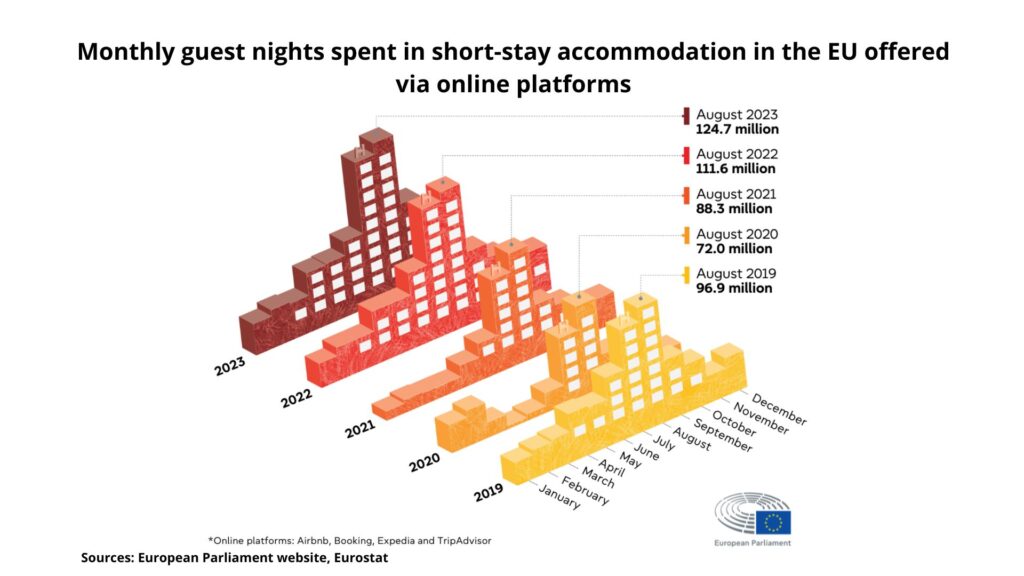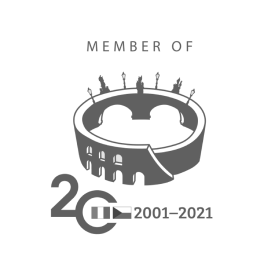
Short-term rentals: EU efforts for more transparency
The surge in popularity of short-term rentals in recent years has transformed the landscape of the tourism industry, becoming a significant component representing nearly a quarter of the total accommodation supply in the EU. While offering undeniable benefits and opportunities for landlords and the overall tourism ecosystem, their rapid growth has raised concerns.
In particular, there is a worry that this expansion may contribute to a reduction in available dwellings for housing needs and an escalation in rental housing prices, especially in popular tourist destinations such as Prague, and eventually the overall impact on the livability of some areas.
Between 2019 and 2023, there was a notable rise in the number of bookings through the four leading online platforms, with monthly nights booked in the EU increasing from 96.9 million to 124.7 million.

Main challenges related to short-term accommodation rentals
The surge in short-term rentals has presented several challenges. First, the absence of transparency in rental operations poses difficulties for authorities in effectively monitoring and regulating these services.
Additionally, there are some regulatory hurdles for public authorities that encounter challenges in ensuring compliance of short-term rentals with local regulations, taxation, and safety standards, primarily due to inadequate information.
To conclude, some local authorities struggle to manage the rapid expansion of short-term rentals, which alters residential areas and places additional strain on public services such as waste collection.
EU response to the problem
In November 2022, the European Commission proposed measures to enhance transparency in the realm of short-term rentals to assist public authorities in fostering sustainable tourism. Subsequently, a consensus on this proposal was reached between the Parliament and Council in November 2023.
The prospective regulation aims at addressing the primary deficiencies of this service, notably the lack of transparency due to the absence of reliable data about landlords and their business which poses a challenge in accurately assessing their true impact, hindering the development of effective policy measures by the public sector.
Another presently challenging facet of short-term rentals lies in the significant differences in requirements imposed on hosts or online platforms such as Airbnb across different Member States. While some countries have already established registration systems mandating the submission of diverse information, this wide variation in regulations may impede the efficiency of conducting business within the European single market.
To tackle the aforementioned drawbacks, the Regulation strives to establish a unified registration system. Under this system, every short-term rental provider must provide their identification details along with the rented unit’s address or service duration. A duly identified host will be issued a distinctive number similar to a tax ID, and they will be required to furnish this registration number to online platforms which are obliged to check it and the accuracy of property details.
Moreover, in order to obtain data from platforms regarding host activities, EU countries will establish a unified digital entry point to give support to local authorities in comprehending rental activities and enhancing tourism. In particular, large and medium-sized platforms will be required to regularly report to public authorities every month, detailing the number of rentals, their locations, or the websites of the offering parties. On the other hand, for micro and small platforms, a simpler system for data sharing will be implemented and this reporting obligation will occur every three months. The gathered data will then be centralized in a database, facilitating evaluation and enhancing the effectiveness of both EU and domestic legislation.
To identify irregularities, random spot checks will be conducted, involving the selection of a number of landlords for premises inspection. In cases where a provider fails to disclose essential information, they may face a ban on operations, accompanied by additional sanctions (fines) determined by individual Member States.
The overall data produced will be exchanged among public administrations throughout the EU, contributing to tourism statistics and empowering administrations in the fight against illegal offerings. Ultimately, this initiative will hopefully foster a more sustainable tourism ecosystem that aligns with its digital transition.
The EU parliament’s internal market committee approved the provisional agreement in January 2024 while the Parliament is set to vote on the report at the end of February, but before the new directive enters into force, the provisional agreement needs to be adopted by the Council. After that, EU member states will have 24 months to implement it.
The regulation is thus expected to take effect in two years, with the prospect of expanding the list of registers and records in the Czech Republic in 2026 to include a non-public register of short-term rentals.
All that glitters is not gold
The new EU rules on short rentals are an important step forward in regulating a fast-growing and evolving sector. However, the directive is not without its critics and challenges, both from industry stakeholders and consumers.
The new provisions could improve the transparency, protection, and sustainability of the sector by preventing tax evasion. On the other hand, there are concerns that increased bureaucratic and tax burdens, and restrictions on the length of stays, will limit the flexibility and competitiveness of the non-hotel sector.
The Czech Republic is already taking action
Just to give an idea of the relevance of the phenomenon in the Czech Republic, while up-to-date information on the number of tourists using online accommodation platforms is unavailable, statistics from 2022 indicated around 6 million overnight stays occurred in the Czech Republic via booking portals Airbnb, Booking.com, Expedia, and Tripadvisor. More than half of these stays occurred in Prague, and roughly 70% of them were from foreign tourists.
The Czech Republic is now preparing to introduce measures aimed at supervising private owners utilizing those platforms for short-term rentals, as part of an initiative to regulate the informal economy.
The proposed amendment to the country’s Act on Business Conditions in the Tourism Industry, responding to a European Commission regulation, is anticipated to take effect in July 2025. Aligned with the EU Commission’s proposal, the amendment mandates the registration of short-term accommodation providers and the assignment of a unique registration number, which must be displayed on every platform listing. The responsibility for regularly sharing information about these registration numbers with the Ministry of Regional Development lies with the respective platforms.
The primary objective of the amendment mirrors that of the EU proposal, focusing on enhancing transparency in the short-term accommodation sector and addressing activities existing in a regulatory gray area.
Many providers currently operate unofficially, leading to unfair competition and regulatory challenges. With the implementation of this amendment, the state aims to gain better oversight of hosts and accommodation facilities in the sector.
Sources: https://www.grantthornton.cz/, https://www.europarl.europa.eu/, https://www.consilium.europa.eu/, https://www.buonenotizie.it/, https://www.expats.cz/




